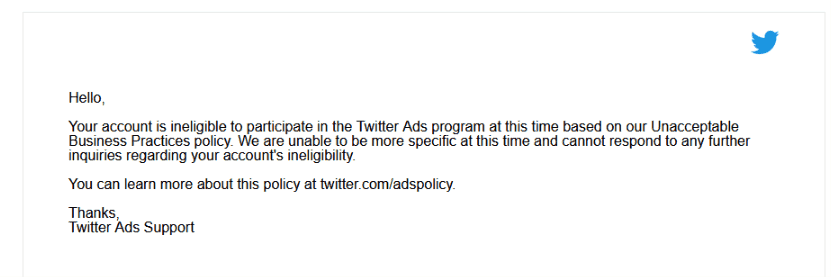The other day I was starting to set up some ads on Twitter for the various plugins that I sell. After setting up the ad accounts, your account goes through a bit of a review process. No problem I thought. It’s probably an automated review that will be up and running in no time.
Nope.
When I logged into one of my Twitter Ads accounts, I found a notice like this:

OK, no problem I thought. I’ll just read through the Twitter Ads Policies and figure out what I did wrong, fix it, and request my account be reinstated.
**Me reading Twitter Ads Policies**
Nope, not selling anything illegal, unsafe, or misleading. No drugs, “adult” products, weapons, hate content, or endangered species (seriously? WTF?). Not selling fireworks, controlled substances, dietary supplements, tanning devices, gambling or tattooing services. Nothing subject to copyright, counterfeit goods, or distributes spam/harmful code.
Honestly, I had no idea what my plugin had to do with any of those restricted categories or policies. I decided to reach out to Twitter support to get an answer. The response I got from Twitter is below:

Oh, good a canned response! At least they provided me with a link to their policy so I can get to the bottom of the issue.
Nope, wrong again. They just linked back to the same support article I checked earlier.
I responded asking for some clarification on their decision. You know, to sort of figure out what went wrong so I can fix it and perhaps start giving them some of my money!
The response I received was unbelievable:

We are unable to be more specific at this time and cannot respond to any further inquiries regarding your account’s ineligibility.
What. The. Hell.
Own Your Content
Fortunately for me, my business is not dependent on Twitter to be successful. But this brought up a great point about owning your content and the platform it runs on.
See, when you open an account on any social media site, you really don’t own any of it. It’s sort of rented space (that you pay nothing for). Sure, you technically own the content you produce, but you still have to play by the house’s rules.
Because of this low barrier to entry, there are many successful people who have amassed a huge social media following and have managed to monetize it very well.
What if those people woke up tomorrow and their social media platform of choice disappeared, or at least the users on the account stopped logging in?
Don’t think it could happen? Just ask any band that was popular in 2006 how their MySpace strategy is going today.
Go ahead, I’ll wait. ????
Here today, gone tomorrow
Let’s face it. While you technically own your content posted on social media, what can you do with it off of those platforms? There isn’t a way to export all of your Facebook page’s posts, and import them to Twitter, or another social network. The same is true for any other social network. Basically, you’re not going to take your content with you.
Imagine all that hard work you spent crafting posts with the perfect message, researched hashtags, and posting at the optimal time for engagement. Poof. Gone. Along with that would go all of your likes, shares, followers, retweets, etc.
Even if the social network gave you a way to export all of your content, what would you do with it? And who would you share it with? All of your followers might be gone too.
It doesn’t need to be a drastic change like MySpace was where basically everyone jumped ship for Facebook. It could be a simple policy change that you’re in violation of. Clearly, Twitter feels no obligation to explain what portion of their policy I was violating. What makes you think any other social network feels that obligation?
Vanity metrics
All of the social media stats you’ve accumulated – likes, shares, followers, etc. – are all “vanity metrics”. You can’t take that with you off of their platform, and it can be taken away in an instant.
What Do I Own Then?
To put it simply, your website is one of the few online assets that you truly own in the sense that you can do whatever you want with it. You can take it with you from one host to another, change the look, content, etc. to your heart’s content.
But you have to be smart about it.
Website builders are not your friend
Wix, Squarespace, Shopify, and others are page builder services that require virtually no technical skills. But what makes your content on those sites any different than the content on a social media site?
Those sites provide you with their platform to host your content on their servers.
What’s stopping them from changing their policies tomorrow and shutting down your site without warning?
Imagine if you made 100% of your living on your Shopify store. Then out of the blue, you got a notice from them that your shop was being shut down. No explanation, no ability to retrieve your sales reports, inventory, customer information. Nothing.
What would you do? You’d essentially be starting from scratch elsewhere. Hopefully, you would have had enough money saved up to build another website someplace else. In the meantime though every minute your store is offline you’re losing revenue and customers are wondering where your site went. Will those customers even trust you if and when you eventually get your site back online?
How to own your content
Use a content management system for your website that has no restrictions on your continued use of it. WordPress, for example, is a free, open source software that lets you use it for whatever purposes you want to use it for.
Think about all of the restricted categories that I mentioned earlier from Twitter’s Ad policy. If you want to distribute fireworks, weapons, dietary supplements, “adult” products, or hell even hate speech. No one is going to stop you.
Don’t put hate speech on your site.
You’ll never get a visit from the “WordPress Police” saying you’ve violated their policies on your website.
You might say: What about hosting? My host can shut my site down just like any of the other examples given.
Sure, your host can shut your site down. Perhaps they changed their policy and your site is now violating their terms.
OK, no problem. Find a new host that doesn’t have the same restrictive terms, and move your site there. You should have a local backup of your site available (you do have backups, right?), which will make it really easy to move to another host.
Yea, your site may have a little downtime, but you can be back up and running in a few hours.
And your site doesn’t need to be on WordPress (although I highly recommend it). Joomla, Drupal, and other similar content management systems offer the same benefits of portability. Similarly, no Joomla|Drupal|Etc. Police will be knocking on your door.
So, I Should Only Do Marketing On My Website?
No, of course not. That would be silly.
Social media sites like Facebook, Twitter, Instagram, YouTube, etc. aren’t going anywhere for a while. Their policies are also not likely to do a 180° turn overnight.
Email services like MailChimp, Constant Contact, etc. are other options you can use to market your products or services.
My point with this article is, don’t put all your eggs in one basket. Having thousands of followers on your Facebook page or Twitter account is great…for now. If your followers come down with shiny object syndrome, they could forget about you and move on to the next best thing.
Think of your website as the core of your online marketing strategy. Make that core solid – no one should be able to take that content away from you.
Use the other accounts (social, email, etc.) to supplement the traffic to your website. But do so in a manner that will allow you to continue operating even if one or more of those channels was to disappear overnight.




Awesome read Scott. I work a lot with Etsy sellers and i spend most of my time telling them that they do not own their Etsy store. ‘No no, I do, I don’t do anything wrong, so they won’t close my store’. But like Twitter’s backwards policies, rival Etsy stores can complain about your store for no apparent reason. 2 or 3 of these and your Etsy store is closed down. If Etsy is your only source of income, well, there goes your income.
Time and time again, if you own your website, you own what you’re selling. It was really refreshing to hear this same argument in a different light!
Glad to hear a different perspective on this situation. Physical products on Etsy, digital goods, or any products really can benefit from being hosted and provided for on your own website. Thanks for the comment!